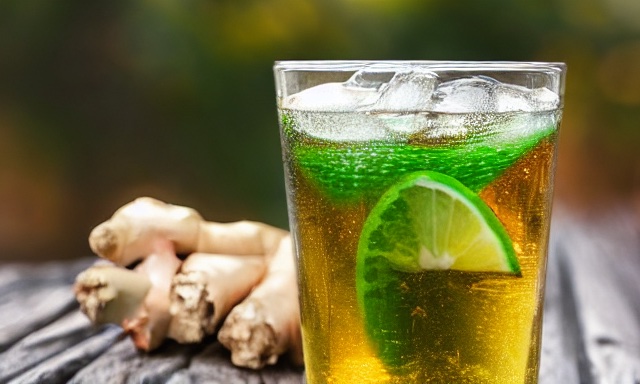Internet Asks: “Does Ginger Ale Have Caffeine?”
When it comes to fizzy beverages, ginger ale stands out with its distinct flavor and soothing properties. Whether enjoyed as a standalone drink or used as a mixer in cocktails, ginger ale is a popular choice for many. But amidst the ginger's spice and the effervescence, one question often arises: Does ginger ale have caffeine? Let's embark on a fizzy adventure and uncover the truth behind the caffeine content in this delightful beverage.
sponsored links

What is Caffeine?
Caffeine is a natural stimulant found in various plants, such as coffee beans, tea leaves, and cacao beans. It acts on the central nervous system, providing a temporary boost in alertness and reducing fatigue. However, unlike coffee or tea, ginger ale is typically made from ginger root, carbonated water, sugar, and other flavorings, none of which naturally contain caffeine.
The Caffeine-Free Zing
When it comes to ginger ale, you may come across different varieties, such as dry ginger ale and golden ginger ale. While both share the same basic ingredients of ginger root, carbonated water, and sweeteners, there are subtle differences in their flavors. Dry ginger ale tends to have a sharper and spicier taste, with a stronger ginger kick. On the other hand, golden ginger ale offers a milder and smoother flavor profile, often with added citrus notes for a hint of brightness. Whether you prefer the boldness of dry ginger ale or the smoothness of golden ginger ale, both options typically do not contain caffeine, allowing you to enjoy the fizzy goodness without any caffeine-related concerns.
Ginger Ale Ingredients and Caffeine
To fully understand the caffeine content of ginger ale, let's take a look at its typical ingredient list:
- Ginger root: The star of the show, ginger, is known for its spicy and aromatic flavor. It provides the distinct taste that makes ginger ale so refreshing.
- Carbonated water: This gives ginger ale its characteristic fizziness, adding to its effervescent charm.
- Sweeteners: Ginger ale can contain various sweeteners, including cane sugar, high-fructose corn syrup, or artificial sweeteners. These sweeteners contribute to the overall taste and sweetness of the beverage.
- Flavorings: Some ginger ale brands may include additional flavorings like lemon, lime, or other citrus notes to enhance the taste experience.
None of these ingredients inherently contain caffeine. However, it's important to note that some commercial brands of ginger ale may add additional ingredients or flavorings that could include small amounts of caffeine. To ensure a caffeine-free ginger ale, it's advisable to check the label or ingredient list of the specific brand you choose.
Benefits of Caffeine-Free Refreshment
Opting for a caffeine-free ginger ale comes with its perks:
- Gentle on the System: Ginger has been used for centuries to soothe digestive issues. It can help with problems such as indigestion, nausea, and vomiting. This is why ginger ale is often recommended for motion sickness or during pregnancy to alleviate morning sickness.
- Antioxidant Effects: Ginger contains antioxidants, which are compounds that protect your cells from damage and can help ward off chronic diseases like high blood pressure, heart disease, and diseases of the lungs, plus promote healthy aging.
- Versatile Mixer: Ginger ale's distinct flavor makes it an excellent mixer for various cocktails or mocktails. By choosing a caffeine-free version, you can enjoy the flavor and effervescence of ginger ale without any additional stimulant effects.
- Suitable for All Ages: Caffeine-free ginger ale is a family-friendly option that can be enjoyed by children and adults alike. Whether you're hosting a party, relaxing at home, or simply quenching your thirst, ginger ale offers a delightful choice for everyone.
A Word of Caution: Sugar and Sweeteners
While caffeine may not be a concern in ginger ale, it's essential to be mindful of its sugar and sweetener content. Some commercially available ginger ale brands may contain added sugars or sweeteners, contributing to the overall calorie intake. It's always a good idea to read the nutrition label and opt for options with lower sugar content or consider making your own ginger ale at home using natural sweeteners or sugar substitutes.
Conclusion
When you reach for a glass of ginger ale, rest assured that you're choosing a caffeine-free beverage that offers a delightful and soothing experience. Whether you're seeking a refreshing drink, a mixer for your favorite cocktails, or a soothing remedy for an upset stomach, ginger ale provides a zingy and caffeine-free option. So, pop open a bottle, embrace the effervescence, and enjoy the delightful journey of caffeine-free ginger ale.
Disclaimer: This article is intended for informational purposes only. While every effort has been made to ensure the accuracy of the information provided, it remains essential for readers to check the labels of any food or drink product, as formulations and ingredients can change. Furthermore, individual health considerations and dietary requirements should be taken into account when consuming these products. Always consult with a healthcare professional or nutritionist for personalized advice.
sponsored links
References
-
- Harvard School of Public Health. Caffeine. https://www.hsph.harvard.edu/nutritionsource/caffeine/
- USDA. Beverages, carbonated, ginger ale. https://fdc.nal.usda.gov/fdc-app.html#/food-details/174846/nutrients
- Britannica. Ginger Ale. https://www.britannica.com/topic/ginger-ale
- Schweppes. Ginger Ale. https://www.schweppesus.com/products/ginger-ale/schweppes-regular-ginger-ale
- Lete, I., & Allué, J. The Effectiveness of Ginger in the Prevention of Nausea and Vomiting during Pregnancy and Chemotherapy. Integrative Medicine Insights, 11, 11–17. https://doi.org/10.4137/IMI.S36273
- Grzanna, R., Lindmark, L., & Frondoza, C. G. Ginger—An Herbal Medicinal Product with Broad Anti-Inflammatory Actions. Journal of Medicinal Food, 8(2), 125–132. https://doi.org/10.1089/jmf.2005.8.125
People are also reading...
🍏 Are Apples Acidic?
🥛 Does Milk Help Heartburn?
🥭 Are Mangoes Acidic?
Ready to level-up?
Create meal plans 10x faster, follow up with your clients through our mobile app, and never struggle with meal planning or recipe management again.